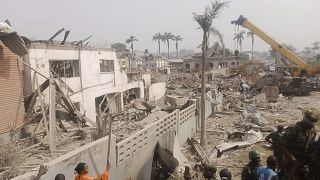Seychelles
Following an explosion at an explosives warehouse and a flooding, the Seychelles archipelago declared a state of emergency on Thursday and urged residents to stay in their homes, according to a statement from the presidency.
The explosion took place in the Providence industrial zone on Mahé and caused extensive damage in and around the area, the presidency added without further details. Mahé is the archipelago's largest island, home to 87% of its population of 98,000.
Public broadcaster SBC confirmed that heavy rains had caused major damage in several areas of Mahé on Wednesday evening.
Known for its paradisiacal white-sand beaches and luxury tourism, the Seychelles archipelago is made up of 115 islands. It is the richest African country in terms of gross domestic product per capita, according to the World Bank, driven by tourism and fishing.
But this index masks major inequalities: due to the cost of living, almost 40% of the population lives in poverty.
East Africa and the Indian Ocean have been hit for weeks by torrential rains and floods linked to the El Niño phenomenon, which have displaced over a million people in Somalia and left over 300 dead in the region, which is highly vulnerable to climate change and where extreme weather events are becoming increasingly frequent and intense.
According to the UN, the situation has been exacerbated by the combined impact of El Niño in the Pacific, which causes abnormally high ocean temperatures, and the Indian Ocean Dipole, a divergence in sea surface temperatures between the western and eastern parts of the ocean.
El Niño, generally associated with rising temperatures, drought in some parts of the world and heavy rainfall in others, is set to continue until April.
This weather phenomenon last occurred in 2018-2019, followed by an exceptionally long episode of La Niña, the opposite (cold) phenomenon that ended this year.
El Niño has already wreaked havoc in East Africa. From October 1997 to January 1998, gigantic floods fuelled by the torrential rains it caused killed over 6,000 people in five countries in the region.












Go to video
Iran: Death toll in port blast rises as crews scramble to stop blaze
Go to video
Roadside bomb kills 8 bus passengers in northeast Nigeria
01:00
Explosion in department store in Taiwan leaves one dead and several injured
01:11
At least 70 die in explosion in Nigeria while collecting fuel from overturned tanker
01:00
See images of the Tesla exploding outside the Trump Hotel in Las Vegas
00:44
Explosion at Turkish Ammunition Factory Kills 12